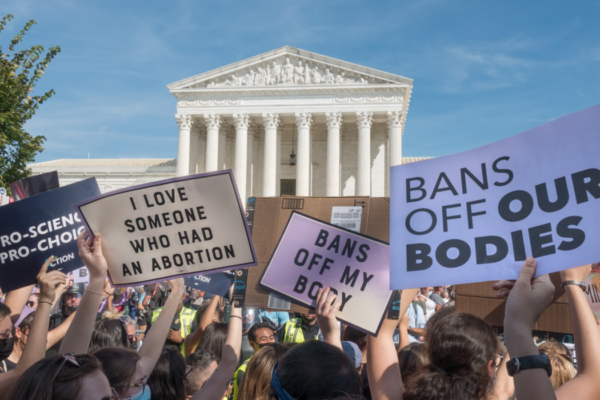
As we head into the final stretch of the midterm election, the national media has been fixated on an impending “red wave,” or a sweeping victory by Republican candidates in the U.S. House of Representatives and the U.S. Senate. While conventional political wisdom supports this idea, a Republican victory is not guaranteed, according to Steven S. Smith, the Kate M. Gregg Distinguished Professor of Social Science in Arts & Sciences at Washington University in St. Louis.
Below, Smith, a leading congressional politics scholar, discusses the factors making 2022 midterms difficult to predict, what’s ahead for the second half of President Joe Biden’s term and the impact the midterm election could have on the future of the GOP.
What are your predictions heading into the midterms?
In general, we expect midterms to reflect some political fundamentals. First, there’s the president’s popularity. If a president’s standing in the polls is down, we expect the other party to perform better in the midterms. And because most presidents are less popular midway through their first term than they were at the beginning, we expect the president’s party to lose seats in the midterm election — that’s a pretty consistent pattern over the last century.
Along with the president’s popularity, the economy tends to drive midterm election outcomes. Factors like inflation, GDP, unemployment and trends in personal income can help or hurt the president’s party.
Based on these fundamentals, we would expect this to be a good year for Republicans. The data on the economy is mixed at best and is getting a lot of attention. Unemployment is remarkably low, but people are worried about a possible recession. Even if we’re not in a recession, fears about one may drive voters to vote against the Democrats. And the president’s popularity is mediocre at best with an approval rating of just 40 to 45%.
However, there is one interesting fundamental that could play to the Democrats’ advantage: Typically, the size of the president’s victory in the previous election has a negative effect on midterms. When presidents are elected by a large majority, they sometimes bring legislators in on their coattails. By midterm, though, those districts revert to their normal pattern and the party loses seats. Biden’s victory was less of a landslide. He easily won the popular vote, but his support was not evenly distributed across the country. Additionally, these congressional districts have become remarkably stable due to hardened partisanship. It’s difficult to imagine voters switching from support for a Democrat two years ago to a Republican this year, especially if the Republican candidate is very conservative. If that’s true, then the models that predict Republicans picking up 25-30 seats may be overestimating the size of their victory.
Do these same fundamentals apply to the Senate?
These models never fit the Senate well. In any given election year, only 33 or 34 Senate seats out of 100 are up for election, meaning 16 or 17 states do not have Senate elections. That means Senate election outcomes are partly a function of which states happen to have seats up for election at the time.
The current Senate seats were last elected in 2016, which was a pretty good year for Republicans. So one might think that 2022 should be a better year for Democrats, but that runs counter to the pro-Republican trend on these other political fundamentals. With many hotly contested races in states like Pennsylvania, Ohio, Georgia, Arizona and Nevada, just a few votes in a couple of states could easily tip the current 50-50 Senate one direction or another.
Democrats in both the Senate and House are frustrated with the president for not taking enough credit for all he has accomplished, which hurts not only his approval rating, but their chances in the midterms. President Biden’s legislative record in the first two years of his term has been surprisingly good. His administration has brought jobs back by the truckload. He’s signed the Inflation Reduction Act, protected the Affordable Care Act, taken action to address climate change, passed major gun violence reduction legislation, and more. These are all things that are quite popular with the public, but many Democrats are disappointed that he hasn’t taken enough credit for it.
‘Typically, the president’s party has a harder time motivating their supporters to vote in the midterm election. But abortion could reverse that trend. If Democrats are successful in motivating more young people and women to vote, the conservative’s Supreme Court victory could — somewhat ironically — hurt their midterm success.’
Steven S. Smith
How might the Supreme Court’s Dobbs decision impact the race?
Democrats have been making abortion rights a central feature in their campaign ads and speeches all over the country, and it appears to have generated an increase in voter registration among women. Early voting numbers indicate that women may be voting at a somewhat higher rate than they have in the past.
Typically, the president’s party has a harder time motivating their supporters to vote in the midterm election. But abortion could reverse that trend. If Democrats are successful in motivating more young people and women to vote, the conservatives’ Supreme Court victory could — somewhat ironically — hurt their midterm success.
Looking ahead, what should we expect from a Republican-led Congress?
If Democrats lose control of Congress — as is expected — Biden’s legislative success will come to a screeching halt. The next two years will be marked by unavoidable gridlock and vetoes.
Democrats will still have enough seats in the Senate to filibuster. When congressional Republicans manage to get things through using reconciliation and other legislative vehicles to avoid filibusters, they’ll find a presidential veto waiting for them. There’s not a chance the Republicans will have the majority needed to block a veto.
We also can expect a renewed interest in tax cuts, big budget cuts. Republicans will likely go after environment and health provisions in the Inflation Reduction Act, as well as other regulations that the Biden administration put into place.
We may see a renewed interest in filibuster reform. Republicans have favored the preservation of the filibuster because they see it as a conservative parliamentary tool. They generally like having a high barrier to creating new federal programs. But some believe that once Republicans are in majority, they might think differently about filibuster reform.
The big unknown is how willing both sides will be to compromise. In the Senate, McConnell might be willing to strike a bargain if he thinks that the conservative position will come out ahead. But I do not expect House Republicans to be in a compromising mood. With a potential 15- or 16-seat lead, they’ll likely try to maximize their leverage.
What’s most likely is that Republicans will hold out to make Biden look like a failure in hope of getting a Republican in the White House in 2024 and maintaining control of Congress.
How might the midterm outcomes impact the GOP going forward?
The future of the GOP could hinge on who wins and who loses in this year’s midterm election.
In the past, both parties gave their members a lot of leeway to craft their own campaigns. Candidates in moderate areas took moderate positions. Candidates in districts that leaned more strongly Republican or Democrat took positions according to their local needs. But over the last quarter century, national media coverage has spilled over into local elections, making it nearly impossible for candidates to overcome the reputation of their party.
There are some Republicans representing fairly moderate districts who are worried that their party’s reputation is becoming too extreme and will cost them votes. Those districts are fewer in number, but they still exist. If the GOP’s victory is held to just a few seats or Democrats manage to hold their majority, Republicans are going to have a major internal fight about the future of the party and who will lead it.
It will not be easy to be Speaker McCarthy! Most likely he will have a small majority. If he wants to avoid calamity like failing to increase the national debt and causing a government shutdown, he will need to get his party together.


